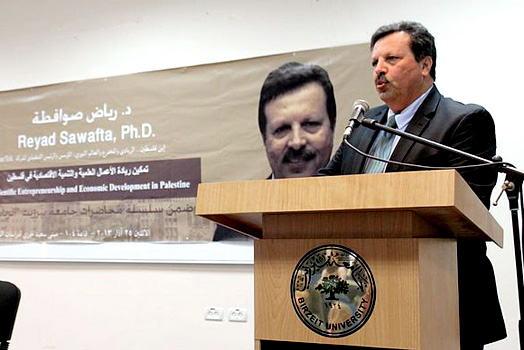Birzeit University Hosts Palestinian-American Inventor and Nuclear Scientist
As part of a lecture series on “Entrepreneurship and Leadership,” Birzeit University on March 25, 2013 hosted Reyad Sawafta, the founder and chief executive officer of North Carolina-based QuarTek Corporation.
QuarTek Corporation is a privately held nanotechnology company that Sawafta founded in 2004 (see http://www.quartekcorp.com). He describes QuarTek as "a company dedicated to introducing innovations for the benefit of mankind." One such innovation is the creation of products that use nanotechnology to provide safe drinking water for disadvantaged communities by converting contaminated water into safe and drinkable water.
Prior to founding QuarTek Corporation, Swafta held various positions in academia and private industry, and served on numerous national and international advisory committees and boards, receiving many awards. His expertise includes nuclear physics, high-speed technology, magnetic applications and designs, biotechnology, and nanotechnology. Sawafta obtained his Ph.D. in Nuclear Physics from the University of Alberta, Canada in 1987. He is the holder of numerous patents and patent applications for his inventions, has authored more than 150 scientific papers and presented more than 200 invited talks worldwide.Sawafta is determined to use his success in science and business to benefit the Palestinian community. His latest endeavor is “Invent for Palestine,” a project he founded to encourage scientific innovation by inviting Palestinian college and high school students to submit ideas for inventions that improve the quality of life in Palestine and other underprivileged communities. His company, QuarTek, will help the young inventors and market their ideas.Sawafta‘s lecture at Birzeit was entitled: “Scientific Entrepreneurship and Economic Growth in Palestine.” The full text of the lecture is presented below:The world’s population exceeded seven billion in 2012 and is expected to grow by more than 80 million people annually to reach nine billion in 2050. The quest for safe, secure and sustainable sources to meet the needs of those billions poses one of the most critical challenges of our age. Our civilization will be seeking essential resources on a planet where humans are already shaping the web of life. The increasing demand for these resources is driving researchers at academic and industrial institutions to discover new ways to produce fresh and safe drinking water, extract energy from renewable sources, discover and develop more efficient and affordable medications, materials, products and practices. Innovative research and disruptive technologies are catalysts for the acceleration of growth in knowledge-based economies which provide developing countries big opportunities to compete with developed ones. To play in the knowledge-based economy league, Palestinian policy makers must pave the way for an economic engine by spearheading the shift to a knowledge-based economy. People’s education must be the highest priority starting at the elementary school level and going all the way to the university undergraduate and graduate levels. We need to prepare the current and future generations of our students to lead the way for a better future for our people. Academic and industrial professionals and entrepreneurs have to lead the change; the status quo cannot be maintained. Academicians have to liberate themselves from their self-imposed confinement. As much as we need pure and specialized scientific research in the fields of physics, chemistry, biology, nutrition, agriculture, engineering, medicine and other disciplines, we must regroup in the world of multidisciplinary science and technology and work in teams to conduct applied research that can lead to commercial innovations. Artificial barriers and walls that exist between specialized units at academic institutions must be removed. The challenges that face the Palestinian nation are too complex to be addressed by individual researchers or individual disciplines if we want to develop innovative solutions that can be implemented in timely and cost-effective manners. The future economy has no room for ego and cannot tolerate ignorance, tardiness and incompetence. Despite the fact that Industrial institutions do not have the same brain power or the inventive capacities of academic institutions, they are often more disciplined in approaching problems and coming up with solutions within tough constraints because their own existence is threatened should they fail to reach productivity and profitability within certain timelines. A knowledge-based economy integrates the brain power of academia with the efficiency and business skills of industry and fuels this integration with every available resource from government, foundations and people. The result is a transformation of information into knowledge - leading to advanced technology, efficient production and job creation, all of which provide the cornerstones for a prosperous future for the nation as a whole. A critical mass of established and young Palestinian researchers and entrepreneurs must be brought together by building collaborative bridges at the national, regional and global levels to shed light on these issues and to develop policy recommendations. In the meantime, we do not need to reinvent the wheel; we can learn from the experience of others. Developed countries have spent hundreds of billions of dollars to develop advances in medicine, engineering, material science, nanotechnology, biotechnology, telecommunication and advanced electronics. We need to use this wealth of accumulated knowledge as a starting point for the development of innovations that will ensure a prosperous future for the people of Palestine. Social networks have to be employed in our future efforts to document and collect needed knowledge from all sorts of media, to create collaborations at all levels and to build connectivity between philanthropists, entrepreneurs, researchers, policy makers, manufacturers and consumers. The effectiveness of social networks have been demonstrated in the past three years in promoting change and breaking the fear factor among young generations in the Arab world. The same tools can be used to break the fears of scientific researchers and entrepreneurs to help promote their confidence and provide them with the necessary tools to translate their ideas into profitable innovations and successful businesses.







